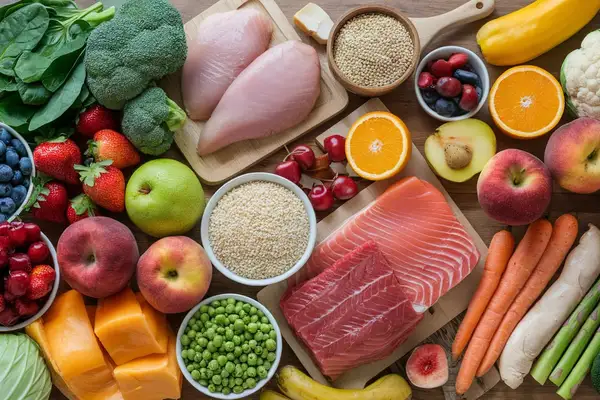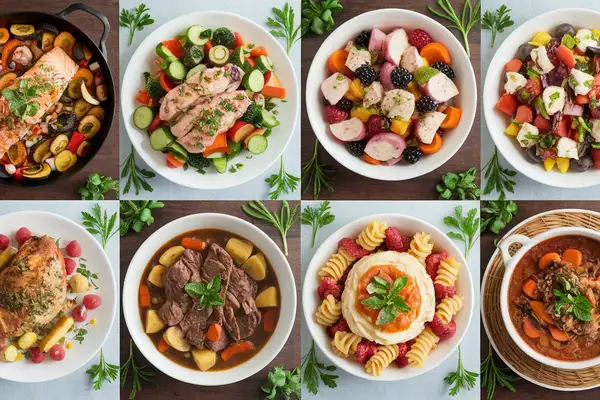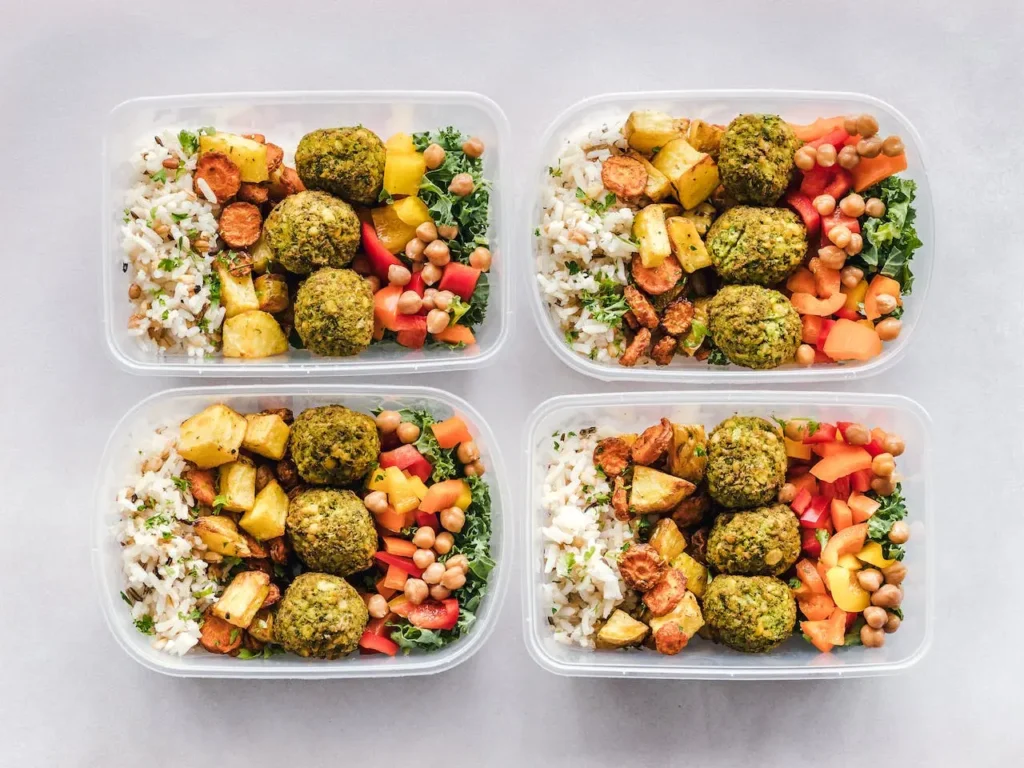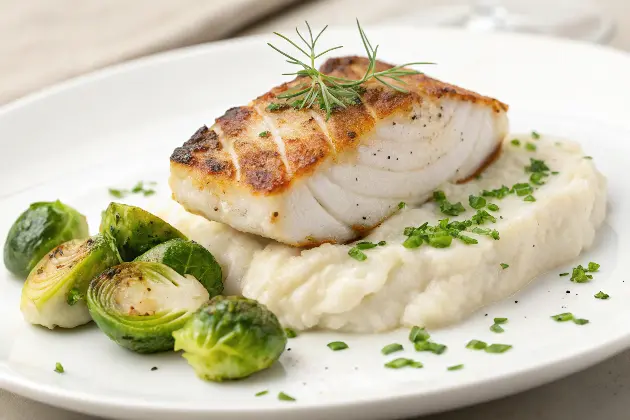7-Day Meal Plan for Cancer Patients | An Ultimate Guide
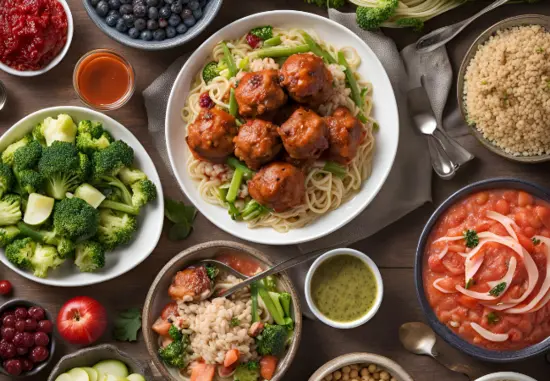
This post may contain affiliate links, meaning I may earn a commission if you make a purchase, at no extra cost to you. I only recommend products I trust. Thank you for your support.
Proper nutrition plays a vital role in the management of cancer and its treatment.
Cancer and its therapies can often lead to various side effects, such as loss of appetite, nausea, fatigue, and digestive issues, which can make it challenging to maintain a healthy diet.
However, a well-designed meal plan for cancer patients can help address these challenges and ensure that cancer patients receive the necessary nutrients to support their recovery.
By incorporating a balanced and nutrient-dense diet, cancer patients can optimize their overall health and resilience during this challenging time.
This comprehensive 7-day meal plan for cancer patients aims to nourish the body and offer a practical guide to help navigate the dietary needs during this journey.
7-Day Meal Plan for Cancer Patients
This 7-day meal plan for cancer patients incorporates a variety of cancer fighting foods, including fruits, vegetables, whole grains, lean proteins, and healthy fats, to provide essential nutrients for cancer patients.
Always consult with a healthcare professional or a registered dietitian for personalized dietary recommendations, particularly for cancer patients, as individual nutritional needs may vary.
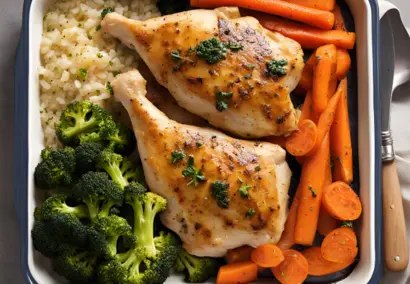
Day 1
Breakfast:
- Berry and spinach smoothie (blend mixed berries, spinach, Greek yogurt, and almond milk)
- Whole grain toast with almond butter
Lunch:
- Grilled salmon (5 oz) salad with mixed greens, cherry tomatoes, and a drizzle of olive oil and lemon juice
- Quinoa and vegetable soup
Dinner:
- Baked chicken breast (4 oz) with roasted broccoli and carrots
- Brown rice pilaf
- Mixed berry salad with a sprinkle of chia seeds for dessert
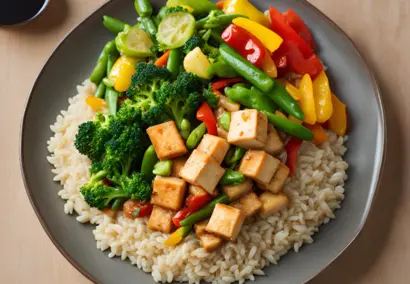
Day 2
Breakfast:
- Overnight oats made with rolled oats, almond milk, chia seeds, and topped with sliced kiwifruit and a sprinkle of nuts
Lunch:
- Whole grain wrap with grilled chicken, mixed greens, and sliced tomatoes
- Carrot and ginger soup
Dinner:
- Stir-fried tofu with broccoli, bell peppers, and snap peas served over brown rice
- Steamed asparagus with a squeeze of lemon
- Fresh fruit salad for dessert
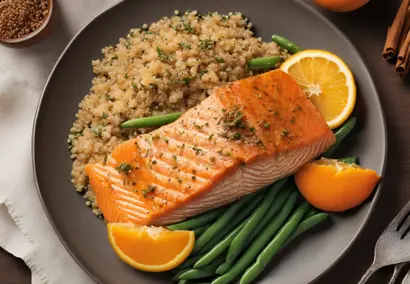
Day 3
Breakfast:
- Greek yogurt parfait with layers of mixed berries, granola, and a drizzle of honey
Lunch:
- Lentil and vegetable stew
- Whole grain roll with a side of hummus
Dinner:
- Baked salmon with a side of quinoa and steamed green beans
- Sliced oranges sprinkled with cinnamon for dessert
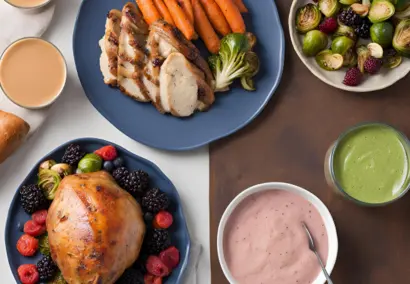
Day 4
Breakfast:
- Scrambled eggs with spinach and tomatoes
- Whole grain toast with avocado
Lunch:
- Chickpea and vegetable salad with a lemon-tahini dressing
- Minestrone soup
Dinner:
- Grilled turkey breast with roasted carrots and Brussels sprouts
- Whole grain dinner roll
- Mixed berry smoothie for dessert
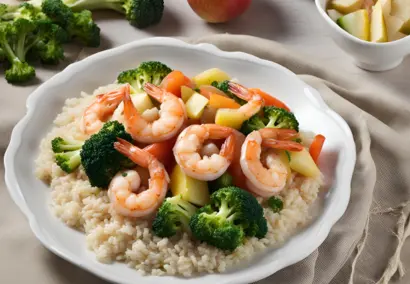
Day 5
Breakfast:
- Smoothie bowl topped with sliced bananas, berries, and a sprinkle of flaxseeds
Lunch:
- Quinoa salad with mixed vegetables and a light vinaigrette
- Lentil soup
Dinner:
- Stir-fried shrimp with mixed vegetables served over brown rice
- Steamed broccoli with a squeeze of lemon
- Sliced apples with a dollop of Greek yogurt for dessert
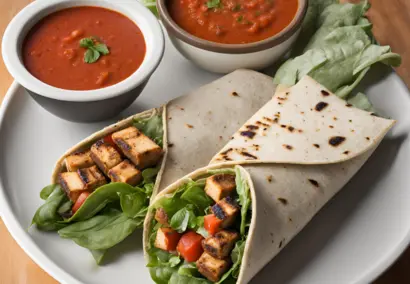
Day 6
Breakfast:
- Chia seed pudding with coconut milk, topped with sliced kiwifruit and almonds
Lunch:
- Whole grain wrap with grilled tofu, mixed greens, and a side of salsa
- Tomato and basil soup
Dinner:
- Baked cod with a side of quinoa and sautéed spinach
- Mixed fruit salad for dessert
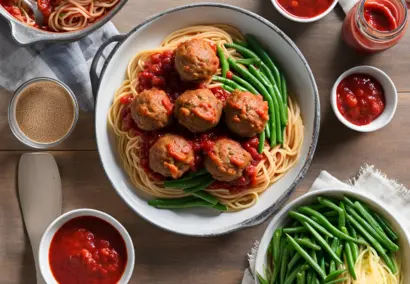
Day 7
Breakfast:
- Whole grain toast with almond butter and sliced apples
Lunch:
- Spinach and kale salad with grilled chicken, cherry tomatoes, and a light vinaigrette
- Vegetable and lentil soup
Dinner:
- Baked turkey meatballs with whole wheat spaghetti and marinara sauce
- Steamed green beans
- Mixed berry smoothie for dessert
Cancer Foods to Avoid in Your Diet
While no specific food can guarantee the prevention of cancer, there are certain foods that are best avoided or consumed in moderation to reduce the risk.
Here are some cancer foods to avoid:
1. Processed Meats
Processed meats contain chemical preservatives and are high in saturated fats, which have been linked to an increased risk of colorectal cancer.
Here are some of the processed meats that cancer patients should avoid:
- Hot dogs
- Sausages
- Bacon
- Salami
2. Highly Processed Foods
These foods often contain high levels of additives, preservatives, and unhealthy trans fats, which have been associated with an increased risk of certain cancers.
- Fast food
- Frozen meals
- Packaged snacks (chips, crackers)
3. Sugary Drinks
Regular consumption of sugary drinks can contribute to obesity and an increased risk of certain cancers, such as breast and colorectal cancer.
- Soda
- Fruit juices with added sugar
- Energy drinks
4. Refined Sugars
Refined sugars can lead to unhealthy weight gain and obesity, which are linked to an increased risk of various cancers.
- Candy
- Pastries
- Desserts with added sugars
5. Charred and Smoked Foods
Cooking meats at high temperatures can lead to the formation of carcinogenic compounds, which may increase the risk of cancer, particularly colorectal and pancreatic cancer.
- Charred meats
- Smoked meats and fish
6. Excessive Alcohol
Regular and excessive consumption of alcohol can increase the risk of certain cancers, including liver, breast, and colon cancer.
- Beer
- Liquor
- Whiskey
- Gin
- Wine
7. Trans Fats
Trans fats are known to promote inflammation and have been linked to an increased risk of certain cancers, including breast and prostate cancer.
- Found in many processed and fried foods
- Margarine
8. Excessive Red Meat
Consumption of red and processed meats has been associated with an increased risk of colorectal cancer, possibly due to the presence of heme iron and other compounds formed during cooking.
- Beef
- Pork
- Lamb
9. Low-Fiber Foods
Low-fiber diets have been linked to an increased risk of colorectal cancer. Fiber helps promote healthy digestion and can reduce the risk of certain cancers.
- White bread
- White rice
- Processed cereals
10. Artificial Sweeteners
The 2023 IARC study has suggested a link between artificial sweeteners and certain cancers like liver cancer, breast cancer, and obesity, although more research is needed in this area.
- Aspartame
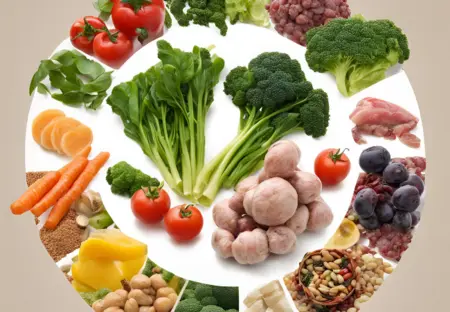
Cancer Fighting Foods to Include in Your Diet
Incorporating certain foods into your diet may help support overall health and potentially reduce the risk of developing cancer.
While no single food can prevent cancer, a balanced diet rich in cancer fighting foods can be beneficial.
Here are some cancer fighting foods to include in your 7-day meal plan for cancer patients:
1. Fruits
Fruits are rich in vitamin C, dietary fiber, and antioxidants, such as anthocyanins and flavonoids, which may help protect cells from damage and reduce inflammation, potentially lowering the risk of cancer.
- Berries (blueberries, strawberries, raspberries)
- Citrus fruits (oranges, lemons, limes)
- Apples
- Kiwifruit
2. Vegetables
These vegetables contain antioxidants, vitamins, minerals, and sulforaphane and indole-3-carbinol, which have been studied for their potential cancer-fighting properties, particularly in relation to breast, prostate, and colorectal cancers.
- Leafy greens (spinach, kale, Swiss chard)
- Cruciferous vegetables (broccoli, cauliflower, Brussels sprouts)
- Carrots
- Tomatoes
3. Whole Grains
Whole grains are high in fiber, vitamins, and minerals, and consuming a diet rich in whole grains has been associated with a reduced risk of various cancers, including colorectal cancer.
- Brown rice
- Quinoa
- Oats
- Barley
4. Legumes
Legumes are a good source of plant based protein, fiber, and various phytonutrients, which can contribute to a lower risk of developing certain types of cancer, including colorectal cancer.
- Lentils
- Chickpeas
- Black beans
- Kidney beans
5. Nuts and Seeds
Nuts and seeds are high in healthy fats, fiber, and a variety of vitamins and minerals, and regular consumption has been associated with a reduced risk of certain cancers, including colon, pancreatic, and endometrial cancers.
- Almonds
- Walnuts
- Flaxseeds
- Chia seeds
6. Fatty Fish
Fatty fish are rich in omega-3 fatty acids and vitamin D, which have been associated with a reduced risk of certain cancers, including colorectal and prostate cancer.
- Salmon
- Mackerel
- Sardines
- Trout
7. Herbs and Spices
Studies have shown that certain herbs and spices have anti-inflammatory and anti-cancer properties, particularly in relation to colon, breast, and prostate cancers.
- Turmeric
- Ginger
- Garlic
- Cinnamon
8. Green Tea
Green tea contains antioxidants called catechins, which may help protect cells from damage and reduce the risk of certain cancers.
- Loose leaf green tea
- Green tea bags
- Matcha green tea
- Green tea extract
- Flavored green tea
9. Mushrooms
Certain mushrooms contain compounds that have been studied for their potential cancer-fighting properties.
- Shiitake
- Maitake
10. Berries
Berries are rich in antioxidants, which can help protect cells from damage that may lead to cancer.
- Mulberries
- Strawberries
- Raspberries
- Blackberries
- Cranberries
- Acai berries
- Goji berries
Benefits of a 7-Day Meal Plan for Cancer Patients
A 7-day meal plan for cancer patients offers numerous benefits that can positively impact their health and well-being during treatment and recovery.
Here are the detailed benefits of a meal plan for cancer patients:
1. Improved Nutrient Intake
- A well-planned meal plan for cancer patients ensures that they receive essential nutrients, vitamins, and minerals crucial during cancer treatment, as the body’s nutritional needs may change due to the side effects of therapy.
2. Balanced Diet
- The 7-day meal plan for cancer patients incorporates a variety of food groups, including fruits, vegetables, whole grains, lean proteins, and healthy fats, essential for supporting the body’s healing process and maintaining energy levels.
3. Includes Cancer Fighting Foods
- Cancer fighting foods provides an array of antioxidants, phytochemicals, and other bioactive compounds that may help protect against cellular damage and inflammation, which are linked to cancer development.
4. Supports Digestive Health
- Incorporating fiber-rich foods, such as whole grains, legumes, and fruits, supports digestive health, alleviates constipation, and may reduce the risk of certain gastrointestinal cancers.
5. Supports Hydration
- The 7 day meal plan for cancer patients includes hydrating foods such as fruits and vegetables, as well as soups and smoothies, to help maintain adequate hydration levels.
6. Boosted immune function
- Nutrient-dense meals and a variety of fruits and vegetables can help bolster the immune system, which may become compromised during cancer treatment.
7. Maintained muscle mass and weight
- A well-structured caloric meal plan for cancer patients can help them maintain a healthy weight during and after treatment and provide the necessary energy for physical activity and recovery.
8. Mental Well-being
- A structured meal plan for cancer patients can alleviate stress and uncertainty around meal preparation, providing a sense of control and routine during a challenging time.
9. Encourages Consistency
- A meal plan for cancer patients encourages consistency in nutritional intake and makes it easier for cancer patients to follow dietary guidelines recommended by healthcare professionals.
Tips for Creating a 7-Day Meal Plan for Cancer Patients
The 7-day meal plan for cancer patients should be tailored to meet the unique needs of each cancer patient, providing them with the necessary nourishment and support during their treatment journey.
It’s essential to consider the following key components of meal plan for cancer patients:
1. Individualized Needs
- Each patient’s nutritional requirements and taste preferences may vary, so it’s essential to tailor the meal plan accordingly.
2. Include Lean Proteins
- Include lean sources of protein such as poultry, fish, tofu, and legumes. Protein is essential for maintaining muscle mass and supporting the body’s healing process during and after cancer treatment.
3. Focus on Nutrient Dense Foods
- The 7 day meal plan for cancer patients focus should incorporate nutrient-dense foods that are rich in essential vitamins, minerals, and antioxidants to support the body’s healing process.
4. Calorie and Protein Needs
- Cancer patients often have increased caloric and protein needs to maintain muscle mass and support the body’s healing processes.
5. Encourage Hydration
- Adequate hydration is crucial, as cancer treatment can lead to dehydration. The meal plan for cancer patients should include a variety of fluids, such as water, broths, and juices.
6. Ensure Food Safety
- It’s essential to prioritize food safety, as cancer patients may have a weakened immune system, making them more susceptible to foodborne illnesses.
7. Include Two Thirds of Plant-Based Foods
- Emphasize a variety of fruits, vegetables, whole grains, legumes, nuts, and seeds to provide essential vitamins, minerals, and phytochemicals which may help in cancer prevention and management.
8. Limit Processed Foods
- Minimize the consumption of processed and refined foods, as they are often high in unhealthy fats, sugars, and sodium. These foods may contribute to inflammation and other health issues.
9. Portion Control
- Encourage appropriate portion sizes to maintain a healthy weight and support overall well-being. Portion control is important for managing energy levels and preventing unintended weight loss or gain.
10. Use Healthy Fats
- Incorporate sources of healthy fats, such as avocados, nuts, seeds, and olive oil. These fats are important for overall health and can provide essential fatty acids.
Resources
- Foods to eat and avoid during cancer treatment
- Foods to avoid in order to avoid risk of getting cancer
- Evidence based cancer prevention diet and survivorship
Conclusion
Maintaining a balanced and nutrient rich diet is essential for cancer patients, as it can support the body’s healing process, manage treatment side effects, and improve overall quality of life.
A 7-day meal plan for cancer patients offers comprehensive nutritional support, promotes the consumption of cancer fighting foods, and contributes to overall physical and emotional well-being during and after cancer treatment.
It serves as a valuable tool in ensuring that patients receive the necessary nourishment to support their health and recovery journey.
If you or a loved one is currently undergoing cancer treatment, consider implementing this meal plan for cancer patients to provide your body with the nourishment it needs.
Remember to consult with your healthcare team to ensure the plan aligns with your individual needs and preferences. Together, we can support your journey to wellness.
- 7 foods to avoid with pituitary tumor
- 17 foods to avoid while breastfeeding
- Ozempic weight loss plan – 6 weeks
- Tips for caregivers caring for cancer patients
- What is follicular lymphoma blood cancer?
- Symptoms of thyroid cancer
- What foods to avoid if alkaline phosphatase is high
- 7-day diet meal plan for pregnant women
- The power of empathy and compassion while caring for patients
- Symptoms of small fiber neuropathy
- What is skeletal dysplasia?
- Foods to avoid while on Contrave
- UTI diet foods to avoid
- What is the cost of ozempic without insurance?
- How to make sea moss gel
- Is boiled corn good for weight loss?
- Does Ozempic need to be refrigerated?
- GOLO 7 day meal plan for weight loss
FAQs
What fruits are recommended in a meal plan for cancer patients?
Cancer patients are advised to consume a variety of fruits, such as berries, citrus fruits, apples, and kiwifruit. These fruits offer different vitamins, minerals, and phytochemicals, so it’s best to choose whatever tastes good and is well-tolerated.
Are there specific dietary recommendations for cancer patients after treatment?
After treatment, the American Institute for Cancer Research recommends a plant-based diet consisting of fruits, vegetables, whole grains, legumes, beans, and lean proteins and to limit red meat consumption to no more than 18 ounces per week.
Can cancer patients include seafood in their diet?
Yes, cancer patients can include seafood in their meal plans as it is a great source of lean protein. However, for immunocompromised patients, it’s important to cook seafood to at least 145 degrees and avoid raw seafood or fish.
Why is it recommended to avoid processed foods in a meal plan for cancer patients?
Processed foods often contain additives, preservatives, and unhealthy amounts of trans fats, which can lead to unwanted weight gain. Moreover, eating large amounts of processed meats has been linked to an increased risk of colorectal cancer.
Should cancer patients take nutritional supplements as part of their meal plan?
No, the American Institute for Cancer Research does not recommend relying on supplements for cancer prevention. While supplements may be appropriate in specific contexts, their use for cancer prevention is not supported by available evidence.
What are the key components of a meal plan for cancer patients?
The key components of a meal plan for cancer patients includes making 2/3 of the plate plant-based, ensuring no more than 1/3 includes animal proteins, and avoiding processed and low fiber foods.
Disclaimer: The 7-day meal plan for cancer patients provided here is intended for informational purposes only and is not a substitute for professional medical advice or treatment. Always consult with your healthcare provider or a registered dietitian before making any changes to your diet.
